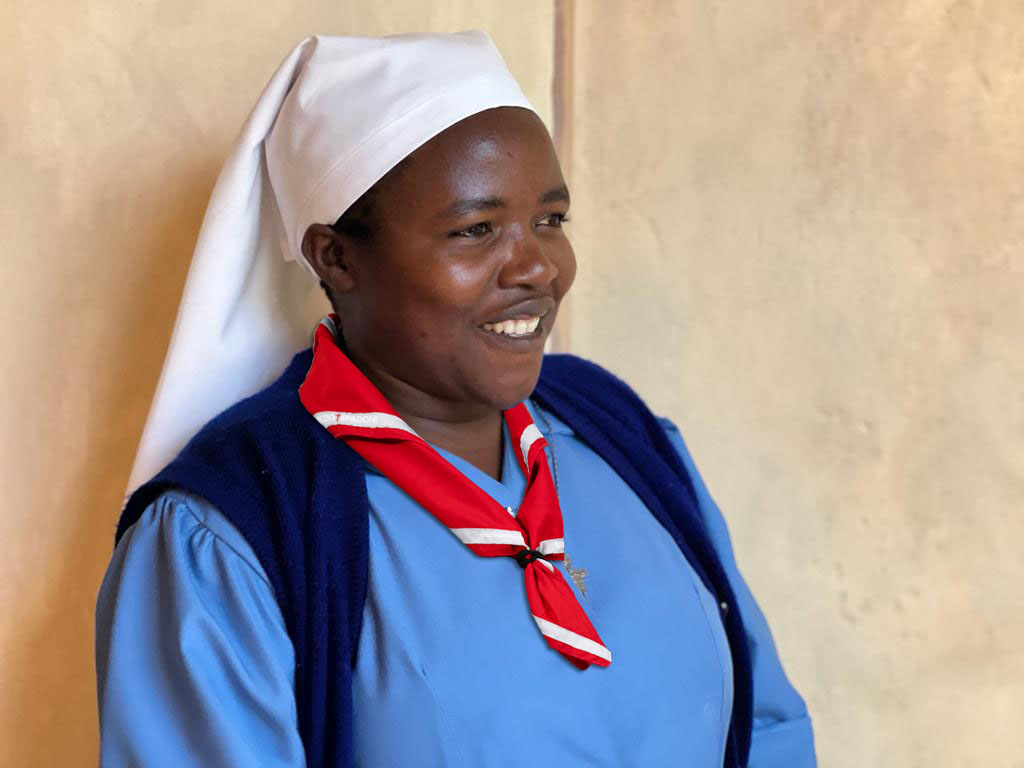
Sister Luminatha and the Volunteers for Works of Mercy
Assisting the sick: a work of mercy in Rwamagana, Rwanda
The works of mercy, particularly care for the sick, are an act of compassion and solidarity rooted in many religious and humanist traditions. This is also the mission Jesus entrusts to the disciples when he sends them out two by two, telling them, “Heal the sick, raise the dead, heal the lepers and cast out demons” (Mt 10:8). We know that Jesus himself appears as a healer of the sick, traveling through the villages to relieve the suffering of those tortured by disease, by demons (Mt 8:16): “They brought to him all who were suffering from various kinds of sickness and pain, the possessed, the insane, the paralytic; and he healed them” (Mt 4:24).
The good example is also given to us in the Parable of the Good Samaritan who cares for the wounded man found on the road but, unable to do so directly, entrusts him to the host, paying the necessary out of his own pocket. (Luke 10:30-37).

In Rwanda, at Rwamagana Hospital
At Rwamagana Hospital in Rwanda, this work of mercy becomes tangible through the efforts of Sister Luminatha and the mercy volunteers. These people dedicate their time and resources to give essential support to the sick, providing not only food, but also human warmth and a comforting presence.
Sister Luminatha, through the reEvolution of the works of mercy proposed by spazio + spadoni, engages with volunteers to embody the essence of the works of mercy, which is to reach out to the most vulnerable and alleviate their suffering. Her presence in the community is not only symbolic: she is active on the ground, organizing food collections, coordinating the volunteer team, and providing spiritual support to all those who stand by her side.
Volunteers
Alongside Sister Luminatha, mercy volunteers play a crucial role in caring for the sick. These volunteers come from diverse backgrounds and bring a variety of skills and resources. Their common motivation is a desire to make a positive difference by experiencing the works of mercy as a spiritual journey and to help those most in need.

Providing food, in particular, is an essential part of their mission. The meals provided to the sick are often the result of donations from the local community. These foods are not only sources of nourishment, but also symbolize generosity and solidarity. For patients, receiving a carefully prepared meal is a source of comfort and dignity, especially for those without close family members to support them.
The impact of this work of mercy is profound and multifaceted. On the one hand, it meets the physical needs of patients by providing them with adequate nutrition, which is crucial especially for those undergoing demanding medical treatments. On the other hand, it meets emotional and spiritual needs by offering compassionate presence and moral support. Patients, who are often isolated and vulnerable, find in this care a source of comfort and hope.
Not just giving food to the sick
Experiencing care for the sick as a work of mercy also promotes a feeling of community and belonging. Patients do not feel abandoned; they realize that people care about their well-being. This awareness has positive effects on their morale and recovery. The work of mercy thus helps humanize the hospital environment, transforming it into a place of solidarity and compassion.
The work of mercy carried out by Sister Luminatha and volunteers at Rwamagana Hospital is a telling example of the impact that compassion and generosity can have on improving a patient’s health. By offering food and moral support to the sick, these volunteers also provide material help; they restore dignity and hope to patients, creating a more supportive and humane community. Their gesture reminds us of the importance of commitment to others, especially the most vulnerable, and invites all of us to reflect on ways we can help make the world more compassionate and supportive.
Source
Images
